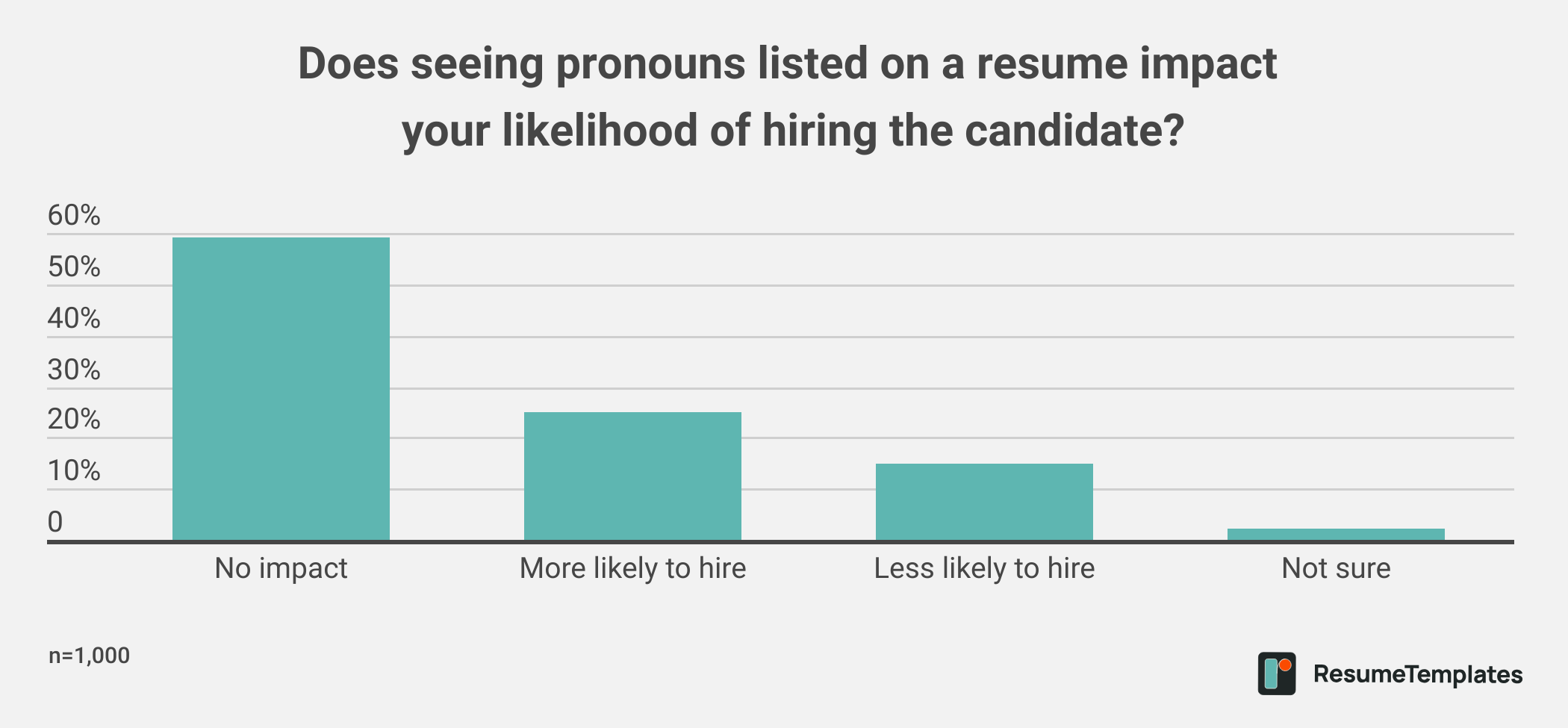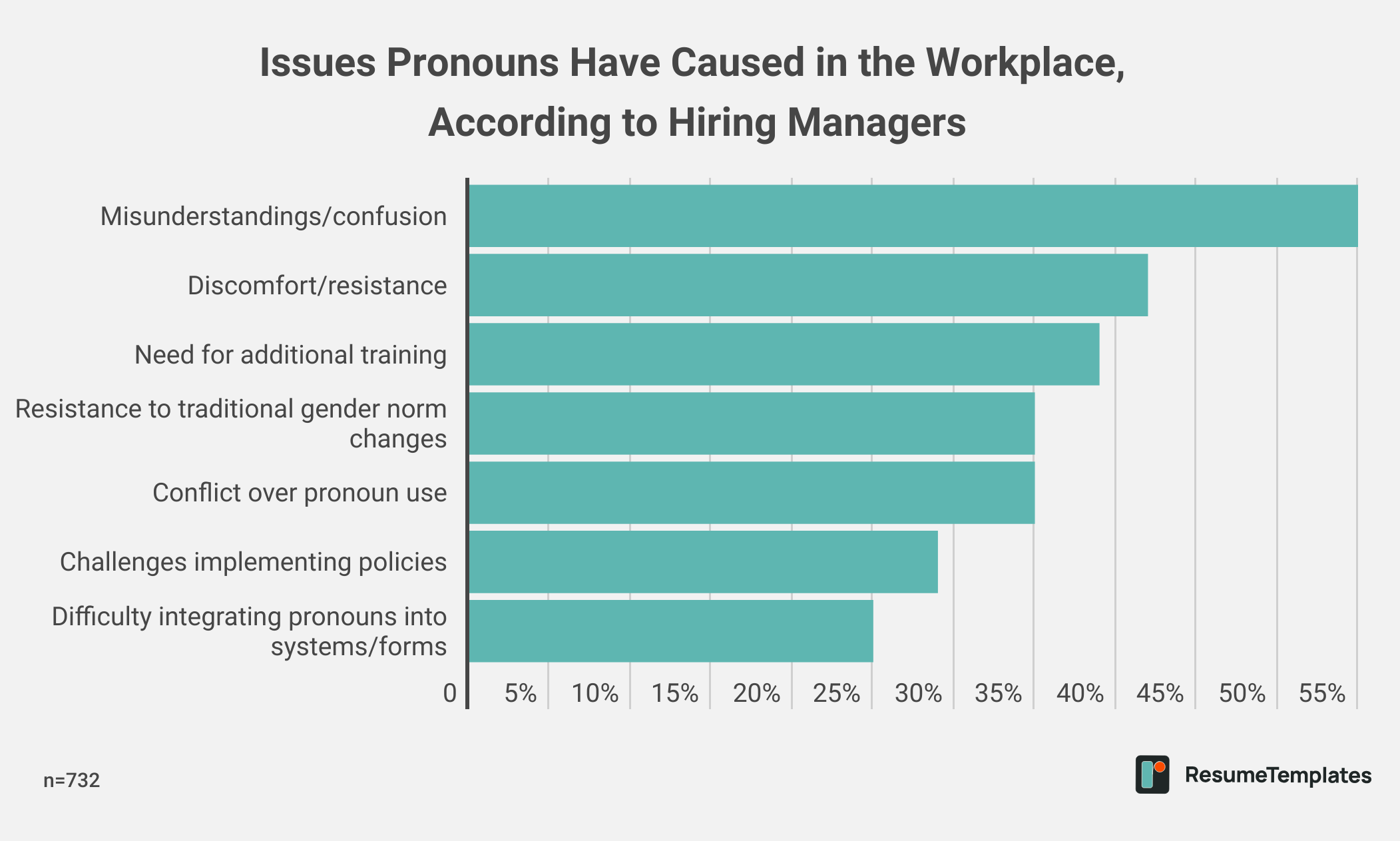Employees are increasingly entering the workplace with diverse gender identities and expressions that differ from traditional norms. However, preferred pronoun usage can be a contentious topic in many workplaces, as people have varying opinions on the matter.
In June, ResumeTemplates.com surveyed 1,000 U.S. hiring managers to understand their attitude toward candidates listing their preferred pronouns on their resumes and the usage of preferred pronouns in the workplace.
Study highlights:
- 25% of hiring managers are more inclined to hire candidates who list pronouns on their resume, while 14% say they are less likely to
- 1 in 3 hiring managers say pronouns are an issue in the workplace
- 3 in 4 hiring managers feel it’s important for them to be educated on gender identities
- Nearly 1 in 5 hiring managers admit they’re uncomfortable using gender non-conforming pronouns in the workplace
1 in 3 Hiring Managers Say Listing Pronouns on a Resume Impacts Hireability
The majority of hiring managers have a positive opinion on employees sharing their pronouns in the workplace, 43% have a very positive opinion, and 23% hold a somewhat positive opinion, while 23% are neutral. However, 5% have a somewhat negative opinion, and 6% have a very negative opinion on employees sharing their pronouns at work.
Similarly, 58% of hiring managers feel very positive (39%) or somewhat positive (19%) about candidates listing their pronouns on resumes. On the other hand, 7% feel somewhat negative, and 8% feel very negative toward this practice, while 26% are neutral.
While the majority (59%) say the practice of listing pronouns on one’s resume has no impact on their likelihood of hiring the candidate, 25% say it increases their likelihood of hiring the candidate, 15% say it decreases it, and 2% are unsure.

25% are more inclined to hire candidates who list pronouns on their resume
One-quarter of hiring managers say they are more likely to hire a candidate who lists their pronouns on their resume.
Seeing pronouns on a resume makes respondents more likely to hire a candidate for several reasons: 73% believe the candidate would mesh well with company culture, 69% think it will help meet diversity and inclusion initiatives, and 57% have a personal preference for people who include their pronouns.
14% are less likely to hire candidates who list pronouns on their resume
On the flip side, 14% of hiring managers surveyed say they would be less likely to hire a candidate who adds their pronouns to their resume.
Seeing pronouns on a resume makes hiring managers less likely to hire a candidate for reasons including: 63% are concerned the candidate is too political, 61% fear potential conflicts with other employees, 58% believe the candidate would not mesh well with company culture, and 41% have a personal aversion to the idea of listing pronouns.
When it comes to candidates specifically utilizing they/them pronouns, hiring managers have a similar attitude. A total of 22% say seeing these pronouns on a resume increases their likelihood of hiring the candidate, while 15% say it decreases it. Further, 61% say it has no impact, and 3% are unsure.
“It makes practical sense for candidates, and not only for those who are non-binary or transgender, to include their pronouns on their resume. It is also useful information to have if the candidate’s name doesn’t make their gender obvious, allowing you to avoid the uncomfortable situation of misgendering them,” says Rob Boyle, marketing operations director at Airswift.
“Often, these kinds of biases form out of a lack of understanding, or because the individual has a general resistance to change, not because of any contradicting value or belief that they hold. It should be explained to hiring managers the practical value of including pronouns on resumes. If you can help them to see why this information is useful and valid, their bias will often naturally start to break down.
“I also suggest providing mandatory DEI education—ideally for your entire time, but at minimum for those who work in HR. These education programs help people to become more aware of the types of discrimination certain groups face in the workplace, and strategies they can employ to question and break down their own biases both known and unconscious.”
1 in 3 Hiring Managers Say Pronouns Are an Issue in the Workplace
According to hiring managers, pronouns are a major issue (10%) or somewhat of an issue (23%) in the workplace. On the other hand, 41% say pronouns are not much of an issue, and 27% say pronouns are not an issue at all.
Most common issues are misunderstandings, confusion, and resistance among employees
According to hiring managers, the issues pronouns cause in the workplace include misunderstandings or confusion about which pronouns to use (55%), discomfort or resistance from some employees in using certain pronouns (42%), the need for additional training and education on pronoun usage (39%), resistance to change from traditional gender norms (35%), and tension or conflict among employees over pronoun use (35%).
Additional challenges include difficulties implementing pronoun policies or guidelines (29%) and issues with integrating pronouns into digital systems and forms (25%).

3 in 4 Hiring Managers Feel It’s Important for Them To Be Educated on Gender Identities
About 50% of respondents state that hiring managers at their company receive training on non-binary identities and pronouns, while 40% report they do not, and 10% are unsure.
In terms of the importance of such education, 48% believe it is very important, 27% consider it somewhat important, and 12% are neutral. On the other hand, 6% find it somewhat unimportant, and 7% think it is very unimportant.
“We may not be aware of how our unconscious attitudes or stereotypes affect the choices we make and the way we act. This is called implicit bias,” says Stephen Greet, CEO and co-founder of BeamJobs. “People who hire people and do interviews can also be biased, which can change how they judge candidates without meaning to. Giving hiring teams implicit bias or diversity training can help them be more aware of these unconscious biases and give them tools to help them see and lessen their effects. They can teach you how to spot common biases, how to evaluate candidates objectively, and how to keep an open mind throughout the whole hiring process.”
Nearly 1 in 5 hiring managers are uncomfortable using gender non-conforming pronouns in the workplace
In the workplace, hiring managers’ comfort levels with using they/them pronouns for non-binary individuals are as follows: 46% feel very comfortable, 25% feel somewhat comfortable, and 11% are not sure of their comfort level, while 11% feel somewhat uncomfortable, and 7% feel very uncomfortable.
Regarding using she/her or he/him pronouns for individuals whose gender identity differs from their sex assigned at birth, 44% of hiring managers feel very comfortable doing so, and 28% feel somewhat comfortable. On the other hand, 10% feel somewhat uncomfortable, and 9% feel very uncomfortable. Nine percent are unsure.
“Putting together diverse hiring panels is a good way to lessen the effect of individual biases and encourage more inclusive decision-making. Hiring panels with people from a range of backgrounds, experiences, and points of view are more likely to come up with new ideas and catch biases early. Diverse panels can question assumptions, give different points of view, and help everyone come to more fair and objective hiring decisions. This method helps to balance out the effects of any one person’s biases and makes the process of evaluating candidates more fair and open to everyone,” says Greet.
This survey was conducted in June 2024 via the survey platform Pollfish. In total, 1,000 U.S. hiring managers were surveyed. To take the survey, respondents had to answer that they are involved with hiring at their workplace and are familiar with the concept of using someone’s preferred pronouns. Respondents also had to meet certain demographic characteristics, including age (25 and up), household income ($50,000 or more), organizational role (manager-level or higher), company size (11 or more), and completed education level (high school or above).
Resume Templates offers free, HR approved resume templates to help you create a professional resume in minutes. Choose from several template options and even pre-populate a resume from your profile.